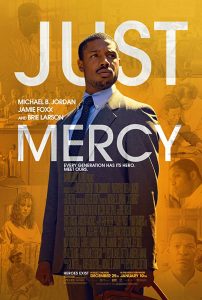
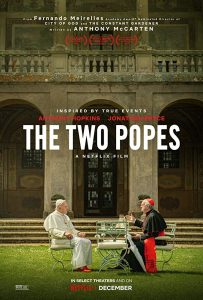










“Just Mercy” (2019). Cast: Michael B. Jordan, Brie Larson, Jamie Foxx, Rafe Spall, Tim Blake Nelson, O’Shea Jackson Jr., Rob Morgan, Darrell Britt-Gibson, Karan Kendrick, Michael Harding, Lindsay Ayliffe, Dominic Bogart, C.J. LeBlanc, Andrene Ward-Hammond, Rhoda Griffis. Director: Destin Daniel Cretton. Screenplay: Destin Daniel Cretton and Andrew Lanham. Book: Bryan Stevenson, Just Mercy. Web site. Trailer.
One would like to hope that justice is served every time a legal matter arises, but, fortunately (or perhaps unfortunately), most of us are wise enough to realize that’s not the case. That’s especially troubling in proceedings where capital punishment is concerned, given the ramifications involved. We can only hope that matters turn out as they should and that the truth is not sacrificed in the process. Such is the dicey conundrum raised in the gripping new, fact-based legal drama, “Just Mercy.”
In 1986, logger Walter “Johnny D.” McMillan (Jamie Foxx) was on his way home from working in the woods near Monroeville, Alabama, when he was stopped at a roadblock and questioned by the local sheriff (Michael Harding). Perplexed at what was happening, Walter quickly learned that he was the prime suspect in the murder of Ronda Morrison, an 18-year-old dry cleaner clerk, a crime for which he was subsequently arrested, convicted, imprisoned and sentenced to death.
The fact that the murder victim was a White woman and that Walter was a Black man was passed off as incidental. But, with this being small-town Alabama, old prejudices lingered even decades after the days of the Civil Rights Movement and despite the fact that Walter had no history of violence. In fact, the only “notoriety” he had earned was for a widely known extramarital affair that he had with a White woman, something that, in the minds of authorities, somehow automatically made him a suspect in an otherwise-unrelated murder. And, because of this, an innocent man now faced the prospect of execution for a crime he didn’t commit. However, an advocate for Walter’s justice would soon be on his way.
In 1989, idealistic young African-American lawyer Bryan Stevenson (Michael B. Jordan) moved to Alabama to work with poor individuals who could not afford legal representation. Having grown up in Delaware with Northern sensibilities, this relocation to the South was something of an eye-opener for the Harvard Law School graduate. However, despite the differences in attitude, Stevenson was by no means naïve, a trait that enabled him to navigate the local conditions and prompted him to work even more aggressively on his clients’ behalf. That was particularly true when he began assisting prisoners on death row.
With the assistance of inmate rights advocate Eva Ansley (Brie Larson), Bryan launched the Equal Justice Initiative to help the underprivileged. But, when he initially met with Walter, he found his prospective client to be quite discouraged, essentially reconciled to his fate. In fact, Bryan had to work hard to convince Walter that it was worth making the effort to take another look at his case. It proved to be a worthwhile decision.
Bryan quickly learned that local officials were so anxious to allay public fears about Morrison’s death that they were willing to do virtually anything to obtain a conviction to be able to say that the murder had been solved, whether or not that was indeed true. In line with that, Bryan discovered that Walter had been found guilty on the basis of flimsy evidence, mostly the questionable and contradictory testimony of convicted felon Ralph Myers (Tim Blake Nelson), who apparently agreed to provide authorities what they wanted in exchange for a lighter sentence in his own pending trial. What’s more, numerous witnesses who placed Walter at a church fish fry at the time of the murder were never questioned about their knowledge of his whereabouts. So, given the foregoing, Bryan sought to get Walter a new trial, one through which he was convinced his client would be exonerated.
However, moving forward proved more difficult than anticipated. When Bryan met with prosecutor Tommy Chapman (Rafe Spall) to seek his cooperation, he refused to help. And, when McMillan family friend Darnell Houston (Darrell Britt-Gibson) agreed to testify in Walter’s defense, he was arrested for perjury, a deliberate act of harassment by authorities aimed at intimidating a potentially key witness from speaking up. These developments called for Bryan to become more aggressive – and more creative – in coming up with tactics to counter opponents who were committed to thwart the attorney’s efforts at every turn. But, with an innocent man’s life on the line, drastic measures are sometimes necessary, as Bryan and Walter found out as their story played out.
It's a pretty safe bet that the majority of us believe in the notion of fairness, especially where justice is concerned. That’s why it so strongly irks us when we see it being compromised or circumvented, especially in legal matters. That’s perhaps most true where capital crimes and punishment are involved; getting things right is so supremely important, because there’s no going back once the sentence is carried out. And pity those who get it wrong.
The strength of our feelings about such matters is so great because of the beliefs that underlie them. Over time, those beliefs gradually translate from theoretical constructs into tangible, realized outcomes, and, given that they relate to life and death matters and the ultimate fate of living and breathing individuals, there’s much at stake, a testament to the power behind these notions. Because of that, we must proceed with the utmost of caution when addressing these issues and the beliefs that underlie them, for they will surely result in manifestations of their original essence, just as anything else does that arises through the conscious creation process, the philosophy that explains how such tangible outcomes are brought into being.
This naturally raises the importance of our manifesting beliefs being infused with truthfulness, sincerity and, above all, integrity. We must be scrupulously thorough in processing such matters, doing all we can to discover the truth, formulating beliefs in line with that and coming up with solutions that adequately address the matters at hand. This is no time to let undue prejudices interfere with our scrutiny. This is no time to let laziness or sloppiness impinge upon our analyses. And, most of all, this is no time to put on blinders or leave things to chance. We must be clear in our beliefs considering that we hold another’s life in our hands.
Which is why it’s so vital that the accused have astute, courageous advocates who can stand up for those who may not be able to fight for themselves as effectively as they otherwise might. These champions often possess the qualities described above and don’t hesitate to employ them in their beliefs and actions to aid those whose lives hang in the balance. They’re firm in their commitments to get at the truth and to raise it to the surface in the cause of justice, as well as in defeating those who would deliberately use subterfuge to subvert this principle and serve their own particular agendas. And, if these advocates perform their duties as they should, the truth will out.
As noted above, engaging in such endeavors requires facing one’s fears, for if these apprehension-based beliefs are allowed to hold sway, they could easily undermine efforts at getting to the truth. This can be difficult even for those who are perceived as being intrinsically powerful. Consider Bryan’s foray into the Alabama criminal justice system of the 1980s and ʻ90s. Despite his Harvard degree, his legal expertise and the backing of the law, he was nevertheless treading into heavily prejudicial territory where many believed a Black man simply was not supposed to wield that kind of power in the first place (let alone be able to make use of it in the support of a racial peer who had been allegedly rightfully convicted of a crime for which he was now living out the sentence served upon him). Such an undertaking could be seen as akin to stepping into the lion’s den, an act of true courage, the kind that sweeps aside fear-based beliefs and enables one to move forward forthrightly to achieve a just and resolute outcome. Now, this is not to suggest that every attorney is some kind of superhero, but those who willingly take on ventures like this often possess the right mix of beliefs to carry out their missions, backed by the types of acumen and actions needed to facilitate them.
As valuable as integrity and courage are, however, sometimes they may not be enough under especially tricky circumstances, as Bryan discovered in his defense of Walter. He found that he needed to get creative in his approach, tapping into his imagination and devising unconventional plans to move his case forward. Given the obstacles being placed before him, Bryan needed to come up with beliefs for solutions that obliterated these limitations and enabled him to get his client’s case heard. This is the kind of ingenuity that conscious creation is designed to help foster, and, fortunately, Bryan had the vision to employ it in his efforts. And, even if he never heard of this philosophy, he obviously understood its principles, making use of them in masterful ways in the face of formidable opposition.
Those who excel in endeavors like this often reap tremendous rewards for their work. But, then, that’s because they’re driven to do it in the first place, following their hearts and beliefs to get the job done – and feeling the devastation when they don’t, incidents that ultimately prompt them to work that much harder at achieving success the next time around. What’s most important, though, is that they stick with their initiatives, because such efforts represent their value fulfillment, the conscious creation concept associated with being our best, truest selves for the betterment of ourselves and those around us. In the work that Bryan did in Walter’s case, and in the many others with additional clients that followed, he has lived out his value fulfillment, bringing attention – and rectification – to many seemingly hopeless situations where justice indeed needed to be served.
Despite some occasional pacing issues and a storytelling approach that’s fairly conventional for films of this type, “Just Mercy” nevertheless reaches out and grabs viewers with an intensity that earns the genuinely heartfelt emotions it evokes from audiences. With fine performances by Jordan and Screen Actors Guild Award nominee Foxx, the picture touches in ways that movies of this stripe typically don’t despite similarity in subject matter and narrative. In fact, the film is so effective in conveying its message that it received the Freedom of Expression Award from the National Board of Review.
One would think in this day and age that we shouldn’t need films with stories like this any more, that we’ve moved beyond having to be reminded of messages like this. Various other pictures, such as “Crown Heights” (2017), “Brian Banks” (2018), “Monsters and Men” (2018) and the recently released “Clemency” (2019), among others, have poignantly dealt with issues of miscarriages of justice and/or questionable death sentences involving minorities, so another story in this same vein might easily be seen as redundant. Yet, given the prevailing conditions in our increasingly polarized society, it’s obvious the need is still there, and, thankfully, we have pictures like “Just Mercy” to step up and help fill that void. Let’s hope that need disappears one day – and preferably sooner rather than later.
Copyright © 2020, by Brent Marchant. All rights reserved.
“The Two Popes” (2019). Cast: Anthony Hopkins, Jonathan Pryce, Juan Minujin, Luis Gnecco, Cristina Banegas, Achille Brugnini, Sidney Cole, Willie Jonah, Germán de Silva, Lisandro Fiks, Renato Scarpa, Federico Torre, Daniel Di Cocco, Josello Bella. Archive Footage: Pope Benedict XVI, Pope Francis. Director: Fernando Meirelles. Screenplay: Anthony McCarten. Play: Anthony McCarten, The Pope. Web site. Trailer.
Getting to where we’re meant to be in life sometimes takes us down some unusual and unexpected paths. We may stand back and wonder why we’re going in a certain direction when we’re convinced we’re supposed to go another way. But, no matter how seemingly far afield we may wander, we often find we’re on exactly the right course, and the journey is one of our own making, based on our innermost heartfelt sentiments. It’s a process exemplified in the new fact-based historical drama, “The Two Popes.”
With the death of Pope John Paul II in 2005, the College of Cardinals convened to elect a successor. The conclave came at a critical time in the history of the Roman Catholic Church, one whose outcome would play a significant role in the future direction of the institution. Would the Cardinals elect a new pope from the conservative arm of the Church in an effort to preserve its longstanding traditions, policies and practices? Or would they strike out in a new direction, choosing a reformer who would bring the Church into the 21st Century and more in line with a world characterized by ever-changing conditions?
In the end, this schism was clearly reflected in the results. The College elected German Cardinal Joseph Ratzinger (Anthony Hopkins) to become Pope Benedict XVI, a staunch dogmatic conservative determined to preserve the institution’s time-honored conventions, a choice disapproved of by many progressive-minded Catholics who believed their concerns would be ignored (and who not so subtly mistrusted the ascension of a German to the papacy). Meanwhile, the runner-up in the balloting was Cardinal Jorge Bergoglio (Jonathan Pryce), the Archbishop of Buenos Aires, Argentina, a reformer who saw a pressing need for the Church to reconsider the close-minded positions of many of its policies, an effort aimed at stopping the exodus of Catholics (especially young ones) from the institution. But, having lost out on his bid to become John Paul’s successor, the Cardinal discreetly returned to Latin America to carry on his work in his home diocese.
[caption id="attachment_11258" align="aligncenter" width="350"] Pope Benedict XVI (Anthony Hopkins, left) and Cardinal Jorge Bergoglio (Jonathan Pryce, right) exchange a series of diverse, sometimes-contentious views about the future of the Church in the new historical drama, “The Two Popes.” Photo by Peter Mountain, courtesy of Netflix.[/caption]
Pope Benedict XVI (Anthony Hopkins, left) and Cardinal Jorge Bergoglio (Jonathan Pryce, right) exchange a series of diverse, sometimes-contentious views about the future of the Church in the new historical drama, “The Two Popes.” Photo by Peter Mountain, courtesy of Netflix.[/caption]
Seven years later, however, Benedict’s reign became embroiled in a series of incendiary incidents that came to be known collectively as the Vatican Leaks Scandals. His ability and willingness to carry on under a microscope of global scrutiny made him quietly but decidedly leery about his future as Pope.
At the same time, a world away, Cardinal Bergoglio began to question his own future, sending a letter to Benedict seeking permission to retire from his position. That inquiry went unanswered for a prolonged period until one day when he was unexpectedly summoned for an audience with the Holy Father. Ironically, he already had a plane ticket for the trip in hand – one that he purchased before receiving the pontiff’s notification.
Meeting at the Palace of Castel Gondolfo, the Pope’s summer residence outside of Rome, Benedict and the Cardinal convened for a series of discussions. The tone was initially contentious, each symbolically reflecting the views that they held regarding the state and future of the Church. And, to confound matters further, Benedict repeatedly refused to address the Cardinal’s retirement request. The cryptic progression of events prompted Bergoglio to wonder why he was asked to come visit in the first place.
In quiet moments together, however, the formal veneer between the two clerics began to drop as each of them spoke about their interests and personal histories. The Pope talked about his musical background and his favorite TV show, among other topics. Meanwhile, the Cardinal spoke about his calling to the Church, citing the time when his younger self (Juan Minujin) broke off his engagement to his fiancée (Cristina Banegas) and joined the Jesuits. Thus began Bergoglio’s odyssey of faith, a journey that took him through a diverse array of religious and secular experiences that brought him to where he was at that moment.
[caption id="attachment_11259" align="aligncenter" width="350"] Upon the death of Pope John Paul II in 2005, the College of Cardinals convene for a conclave to select a successor in director Fernando Meirelles’s latest offering, “The Two Popes.” Photo by Peter Mountain, courtesy of Netflix.[/caption]
Upon the death of Pope John Paul II in 2005, the College of Cardinals convene for a conclave to select a successor in director Fernando Meirelles’s latest offering, “The Two Popes.” Photo by Peter Mountain, courtesy of Netflix.[/caption]
Shortly thereafter, with the scope of the scandals widening, Benedict returned to Rome, accompanied by the still-perplexed Cardinal. But, upon their arrival at the Vatican, the Pope’s reasons for wanting to meet with the Cardinal at last became clear – that he was planning to step down from the papacy and wanted Bergoglio to be his successor, something the Holy Father wouldn’t be able to do if he were to grant the Cardinal’s retirement request.
Needless to say, the Cardinal was shocked. The thought of a pope resigning was virtually unheard of; it represented a break in ecclesiastical and administrative continuity that was seen as inconceivable and unacceptable. And the prospect of ascending to the papacy as Benedict’s successor was overwhelming; Bergoglio felt undeserving of the distinction, especially in light of troubling incidents from his past, most notably his perceived collaboration with Argentina’s military junta in its handling of the nation’s political and social “undesirables” (including fellow Jesuits) during the days of the Dirty War from 1976 to 1983. Through flashbacks interspersed with the clerics’ conversations, viewers witness a younger Bergoglio struggle with his conscience over the handling of these events, particularly where safeguarding the well-being of his colleagues Father Franz Jalics (Lisandro Fiks) and Father Orlando Yorio (Germán de Silva) was concerned, a painful episode that resulted in the future Cardinal’s demotion to a parish priest in a remote locale.
However, the more Benedict and Bergoglio conversed, the more revelatory, profound and reflective their discussions became. It also became apparent that they each had a destiny to fulfill and that they were now at the cross-roads of seeing their fates realized. It would not be long before the Cardinal from so far away would be named the first Jesuit pontiff, Pope Francis.
[caption id="attachment_11260" align="aligncenter" width="350"]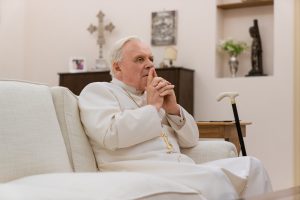 Pope Benedict XVI (Anthony Hopkins) contemplates the radical move of resigning from the papacy in the new, Oscar-nominated drama, “The Two Popes.” Photo by Peter Mountain, courtesy of Netflix.[/caption]
Pope Benedict XVI (Anthony Hopkins) contemplates the radical move of resigning from the papacy in the new, Oscar-nominated drama, “The Two Popes.” Photo by Peter Mountain, courtesy of Netflix.[/caption]
Assuming the role of pope would likely be a daunting task for virtually anyone. It’s an act that carries tremendous responsibilities, not only administratively, but also spiritually. It’s the kind of undertaking that calls for looking deeply within and getting in touch with one’s heart. This frequently calls for making an honest and sincere assessment of one’s innermost intimate beliefs, an ability to take an accurate and comprehensive inventory of these notions as a means for carrying out the duties of the office. And that’s important, for that heartfelt input plays a crucial role in determining the course of events in the Church and, conceivably, in helping to shape the nature of the world at large. Some would call this doing God’s will; others might just as readily say this is an example of the conscious creation process at work, the philosophy that maintains we draw upon these inner intangible resources in manifesting the existence we experience.
There are many examples of this process – and its outcomes – at work in this film. For instance, as becomes apparent early on, Benedict and Bergoglio each become symbolic embodiments of their viewpoints on how they see the Church. Each is a living and breathing personification of their respective outlooks, with Benedict representing the conservative traditionalist and Bergoglio the progressively minded reformer. And those exemplifications (and everything stemming from them) come directly from the beliefs each of them hold.
The clerics’ success at this practice arises from their ability to hear – and listen to – the small, still voice within each of us. Some might call this a search for the word of God, while others might think of this as tuning in to our intuition, a key component in belief formation. Such a distinction is probably more semantic than anything else, given that the results that arise from whatever one calls it are likely the same in each case. This is important, though, considering what can develop from heeding the advice that comes from this practice. For example, when the Cardinal purchased his plane ticket to Rome before receiving the Pope’s summons for a meeting, he wasn’t entirely sure why he was doing so. But his intuitional/divinely inspired hunch proved correct in light of what happened by making the purchase and taking the trip, even if his expectations for the journey didn’t precisely align with the eventual outcome.
[caption id="attachment_11261" align="aligncenter" width="350"] Cardinal Jorge Bergoglio (Jonathan Pryce) considers the daunting possibility of being named a successor to retiring Pope Benedict XVI in the new historical drama, “The Two Popes.” Photo by Peter Mountain, courtesy of Netflix.[/caption]
Cardinal Jorge Bergoglio (Jonathan Pryce) considers the daunting possibility of being named a successor to retiring Pope Benedict XVI in the new historical drama, “The Two Popes.” Photo by Peter Mountain, courtesy of Netflix.[/caption]
Tapping into one’s beliefs also plays a significant role in learning how to balance our inner and outer worlds. As conscious creators know, we draw upon our intangible beliefs to materialize what we experience in our tangible reality, and an acute awareness of this intrinsically connected duality is crucial to those who practice this philosophy, especially anyone engaged in a principally spiritual vocation. By placing excessive emphasis on the inner spiritual realm, we may come to feel less in touch with the physical existence of which we’re just as much a part. While there’s nothing wrong with having a robust spiritual orientation, we must also remember that we’re present in the outer world as well. To that end, ideally we should seek to strike a healthy balance between the two and eschew the temptation to become irretrievably locked into the intangible alone.
As the film illustrates, Benedict often seems so wrapped up in the ecclesiastical life that he loses sight of the real world around him. He’s seen as out of touch and aloof, trying to impose his limited and outmoded worldview on a reality characterized by a greater range of diversity, a narrow outlook that’s kept him from being aware of many of even the most basic aspects of everyday life. The Cardinal, by contrast, has a firm grasp on recognizing the significance of both the spiritual realm from which he draws inspiration and guidance and the physical world in which he dwells. This makes him more pragmatic, more in touch with the commonplace elements of living. He even makes plain his love of such secular pursuits as World Cup soccer and dancing the tango, diversions one may not readily associate with a cleric of his standing. But his ardent attraction to these pastimes illustrates that he’s just as much in the world as he is in his heart.
[caption id="attachment_11262" align="aligncenter" width="350"]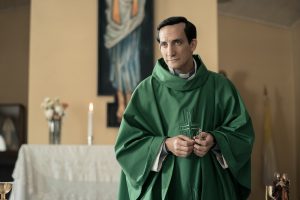 Having been demoted to the position of a parish priest in a remote locale after suspicion of collaborating with Argentina’s military junta during the Dirty War of 1976-83, a young Jorge Bergoglio (Juan Minujin) seeks to find meaning in his calling in “The Two Popes.” Photo by Peter Mountain, courtesy of Netflix.[/caption]
Having been demoted to the position of a parish priest in a remote locale after suspicion of collaborating with Argentina’s military junta during the Dirty War of 1976-83, a young Jorge Bergoglio (Juan Minujin) seeks to find meaning in his calling in “The Two Popes.” Photo by Peter Mountain, courtesy of Netflix.[/caption]
Beliefs also figure significantly into our ability to overcome limitations, as is very much the case with the Cardinal. In many respects, his ascendancy represents a number of firsts: He’s the first Jesuit pope. He’s the first pope from the Americas. And he’s the first pope from the Southern Hemisphere. What’s more, he’s an individual who successfully managed to rise from some of the lowest ranks within the Church to its highest office. And it’s an accomplishment attained by someone who felt unworthy of it, the endorsements and support of others notwithstanding. His experience shows us we can achieve what might seem unthinkable, an inspiring attainment we can all draw from.
As the foregoing shows, using beliefs to satisfy worldly goals is obviously important, but drawing upon them to fulfill intangible objectives is just as significant and attainable, even if the prospect seems less likely. For example, both Benedict and the Cardinal have issues regarding a desire for redemption and forgiveness, something that they each long for but that they both believe may be out of their grasp. However, as conscious creators are aware, beliefs can be used to achieve anything, tangibility considerations aside. When we’re firmly rooted in our beliefs – and have the faith to see them realized – there’s no telling what wishes we can see come true. “Ask and ye shall receive,” it would seem, is a notion not limited to religious texts.
The lives of Benedict and Bergoglio indeed illustrate a rich and fulfilling metaphysical experience, and, from a conscious creation standpoint, they epitomize one of the philosophy’s cornerstone concepts – that everything is in a constant state of becoming. This is especially true for the Cardinal, as seen by his life path. As an individual who sacrificed much to earnestly pursue his faith (and endured numerous hardships along the way), he managed to overcome setbacks and ascend to the highest office of the Church. Bergoglio’s life clearly demonstrates this metaphysical evolution at work, something that ever steers him toward his destiny and that can even occur with stunning speed (such as when he went to Rome to resign and ended up becoming the heir apparent to the papacy). What a remarkable existence indeed.
[caption id="attachment_11263" align="aligncenter" width="350"] At the cross-roads of their respective destinies, Pope Benedict XVI (Anthony Hopkins, left) and Cardinal Jorge Bergoglio (Jonathan Pryce, right) discuss their future roles in the Church in the new historical drama, “The Two Popes.” Photo by Peter Mountain, courtesy of Netflix.[/caption]
At the cross-roads of their respective destinies, Pope Benedict XVI (Anthony Hopkins, left) and Cardinal Jorge Bergoglio (Jonathan Pryce, right) discuss their future roles in the Church in the new historical drama, “The Two Popes.” Photo by Peter Mountain, courtesy of Netflix.[/caption]
This modestly engaging look at the sometimes-contentious, sometimes-brotherly relationship of Pope Benedict XVI and the future Pope Francis details how this highly unusual transition came into being (and why), particularly from the standpoint of the personal motivations involved. However, while this insightful offering (both in philosophical and historic terms) features fine performances by Hopkins and Pryce, as well as a number of thoughtful dialogues about faith, tradition and the future of the Church, the picture’s sometimes-uneven pacing and occasionally wooden, somewhat stagey exchanges tend to bog down the flow of the narrative despite the best efforts of its two leads to conceal these shortcomings. This is by no means a bad film, but it doesn’t always live up to the hyped praise it’s received, either. The picture, which played briefly at a number of film festivals last fall, is now available for online streaming.
The praise that the film has earned has been accompanied by a number of awards season accolades, most notably three Oscar nominations for the performances of Hopkins and Pryce, as well as for its adapted screenplay. The picture duplicated these honors in the BAFTA Awards contest, with additional nods for best casting and best British film. And, in earlier competitions, this release received two Critics Choice Award nominations for the performances of Hopkins and Pryce and four Golden Globe Award nods for best dramatic picture, best screenplay and the portrayals of the two popes.
It's been said “The Lord works in mysterious ways.” Those at the pinnacle of the religious hierarchy clearly understand this. But it’s also true for conscious creators who implicitly place their trust in our divine collaborator, the one who works Its magic to help us transform our intentions into realized dreams (even if It doesn’t necessarily take the route we think It should). What ultimately matters, though, is that we arrive where we’re meant to be, ever evolving to fulfill our wishes and our destiny and, one would hope, to create a better world for us all.
Copyright © 2020, by Brent Marchant. All rights reserved.
Who will end up taking home statues on Oscar night? Find out my predictions in my annual irreverent look at the movies' high holidays on the latest edition of TheCoffeeCast with host Tom Cheevers, available by clicking here. Sensitive listeners, please be advised, strong language warning!
It’s that time of year again – time for my predictions of the winners at the upcoming annual Academy Awards. While some of the likely winners are beginning to come into view, a few are still up for grabs. With that said, here are my picks for who will take home statues in the top six categories this year:
Best Actor The Field: Antonio Banderas, “Pain and Glory” (“Dolor y gloria”); Leonardo DiCaprio, “Once Upon a Time…in Hollywood”; Adam Driver, “Marriage Story”; Joaquin Phoenix, “Joker”; Jonathan Pryce, “The Two Popes”
The Field: Antonio Banderas, “Pain and Glory” (“Dolor y gloria”); Leonardo DiCaprio, “Once Upon a Time…in Hollywood”; Adam Driver, “Marriage Story”; Joaquin Phoenix, “Joker”; Jonathan Pryce, “The Two Popes”
Who Will Likely Win: Joaquin Phoenix. Having picked up the Golden Globe, Critics Choice and Screen Actors Guild Awards for this portrayal, and with the exclusion of his chief competitor (Taron Egerton for “Rocketman”) from the field, Phoenix probably doesn’t face any serious threats from his fellow nominees, despite the generally good quality of their performances. Given that this is Phoenix’s fourth Oscar nomination without a win, Hollywood is probably ready to honor him for what is arguably the best performance of his career.
Who Should Win (Based on the Nominees): Adam Driver. As impressive as Phoenix is in “Joker,” there are many aspects of his performance that are rather repetitive and arguably monodimensional. In light of that, I would give the edge in this category to Driver due to the greater range of required elements. Unfortunately, Driver may not have enough backing to put him over the top this time, but it could be looked upon as a significant down payment toward a future award.
Who Should Win (Based on All Eligible Candidates): Taron Egerton, “Rocketman.” As the winner of the Golden Globe Award for best actor in a comedy or musical, Egerton is the class of 2019’s field of eligible lead actors. His portrayal of rock icon Elton John is positively outstanding, and his snub as a nominee in this field is inexcusable. Perhaps Rami Malek’s win for his role as legendary rocker Freddie Mercury in last year’s “Bohemian Rhapsody” may have hurt Egerton’s chances this year, as some Academy voters may have been reluctant to recognize two consecutive portrayals of pop musicians. That’s a pretty flimsy excuse, though; superb performances are superb performances and should be recognized as such, despite whatever similar roles may have preceded them. With film biographies of other rock musicians already in the works, this could work against those seeking to play those parts, and that would be a shame if their work merits attention.
Possible Dark Horse: Antonio Banderas. This is admittedly a very, very, very long shot at this point, but, as the winner of the best actor award at the 2019 Cannes Film Festival, he can’t be completely ruled out, despite the incredibly long odds.
Also-Rans: Leonardo DiCaprio and Jonathan Pryce. Having won an Oscar for “The Revenant” just a few years ago, it’s likely too soon for DiCaprio to pick up another award, despite the fact that his performance was the only redeeming element of his film. As for Pryce, he should consider his nomination as his award, a well-earned honor for someone who has turned in a number of fine performances over the years (especially in last year’s “The Wife”) and has always been overlooked.
Who Should Have Been Left Out: Leonardo DiCaprio and Antonio Banderas. As good as DiCaprio was, there were a number of other performances that probably could have trumped this one (see below), especially since his chances of winning are so low that this nomination is something of a throwaway. And, where Banderas is concerned, his portrayal was good but certainly not extraordinary (makes me wonder how he won at Cannes as well). Again, another candidate would have made a better choice.
Who Else Should Have Been Considered: There were a number of other worthy performances deserving of consideration, including Adam Driver, “The Report”; Kelvin Harrison Jr., “Luce”; Taron Egerton, “Rocketman”; Roman Griffin Davis, “Jojo Rabbit”; John Lithgow, “The Tomorrow Man”; Paul Walter Hauser, “Richard Jewell”; George MacKay, “1917”; and Michael B. Jordan, “Just Mercy.”
Snubs: Some Oscar watchers were surprised at the exclusion of Adam Sandler from the field for his rare dramatic performance in “Uncut Gems.” But, to be honest, it’s an overrated portrayal, one not all that different from the kind he often gives in many of his alleged comedic turns only in a serious context. Academy voters got this one right. What they got wrong, though, as noted above, was the exclusion of Taron Egerton for “Rocketman.” That oversight was just downright wrong.
Best Actress The Field: Cynthia Erivo, “Harriett”; Scarlett Johansson, “Marriage Story”; Saoirse Ronan, “Little Women”; Charlize Theron, “Bombshell”; Renée Zellweger, “Judy”
The Field: Cynthia Erivo, “Harriett”; Scarlett Johansson, “Marriage Story”; Saoirse Ronan, “Little Women”; Charlize Theron, “Bombshell”; Renée Zellweger, “Judy”
Who Will Likely Win: Renée Zellweger. This is Zellweger’s award to lose. As the pre-awards season favorite, and with victories in the National Board of Review, Golden Globe, Critics Choice and Screen Actors Guild Award contests, Zellweger has a virtual lock on this category.
Who Should Win (Based on the Nominees): Renée Zellweger. Despite some other fine portrayals in this category, Zellweger is nevertheless head and shoulders above her competitors, delivering such a powerful and authentic depiction of entertainment legend Judy Garland that one would swear she was channeling the Hollywood icon. This is clearly a case of an award being given to the right performer for the right performance.
Who Should Win (Based on All Eligible Candidates): Renée Zellweger. See above.
Possible Dark Horse: Scarlett Johansson. This is another very long shot, but Johansson is perhaps the only actress in this category whose portrayal is strong enough to possibly challenge Zellweger. In fact, if Zellweger weren’t in the picture, Johansson would probably be the front runner here. However, given what she’s up against, it’s unlikely she’ll be able to pull off an upset.
Also-Rans: Anyone who isn’t Renée Zellweger, but that’s especially true for Cynthia Erivo, Saoirse Ronan and Charlize Theron. This trio simply doesn’t have enough gas in the tank to mount a successful challenge, despite the strength of their performances (especially Erivo and Theron). Their nominations are their awards.
Who Should Have Been Left Out: Saoirse Ronan. The actress’s cloying, over-the-top, ever-mugging-for-the-camera performance grows annoying quickly, and she clearly doesn’t belong in this field. Her inclusion unfortunately cheated other more deserving performers of receiving worthwhile recognition.
Who Else Should Have Been Considered: There were a number of other worthy performances deserving of consideration, including Awkwafina, “The Farewell”; Lupita Nyong’o, “Us”; Keira Knightley, “Official Secrets”; Emma Thompson, “Late Night”; Taraji P. Henson, “The Best of Enemies”; Cate Blanchett, “Where’d You Go, Bernadette?”; Helen Mirren, “The Good Liar”; Tika Sumpter, “An Acceptable Loss”; Mary Kay Place, “Diane”; Blythe Danner, “The Tomorrow Man”; and Alfre Woodard, “Clemency.” Other possible contenders (who could end up being 2021 candidates) include Lesley Manville, “Ordinary Love”; Catherine Deneuve, “The Truth”; and Eliza Scanlen, “Babyteeth.”
Snubs: While many of the foregoing candidates would have been worth including here, the snubs of Awkwafina and Lupita Nyong’o were inexcusable. They deserved to be included.
Best Supporting Actor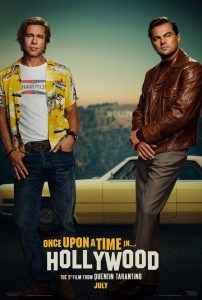 The Field: Tom Hanks, “A Beautiful Day in the Neighborhood”; Anthony Hopkins, “The Two Popes”; Al Pacino, “The Irishman”; Joe Pesci, “The Irishman”; Brad Pitt, “Once Upon a Time…in Hollywood”
The Field: Tom Hanks, “A Beautiful Day in the Neighborhood”; Anthony Hopkins, “The Two Popes”; Al Pacino, “The Irishman”; Joe Pesci, “The Irishman”; Brad Pitt, “Once Upon a Time…in Hollywood”
Who Will Likely Win: Brad Pitt (though God knows why). He’s won virtually everything leading up to the Oscars, and that probably won’t change on awards night (but see below). Given that this is his fourth acting nomination without a win, he may finally break through that barrier this time if present conditions hold.
Who Should Win (Based on the Nominees): Tom Hanks. The veteran actor’s portrayal of children’s TV legend Fred Rogers is spot-on, a fitting and reverent tribute to someone who impacted so many lives in so many positive ways. It’s the kind of performance that’s easy to warm up to, and Hanks makes the most of it, a depiction worthy of the big prize.
Who Should Win (Based on All Eligible Candidates): Tom Hanks, though there are certainly many worthy contenders, both among the nominees (Al Pacino and Joe Pesci) and others (see below). They’re all about on par with one another, and any of them would make good winners.
Possible Dark Horse: Tom Hanks. While Pitt seems to be on firm footing going into the Oscars, my gut tells me that his standing is not a lock, and that’s where Hanks comes in, for several reasons. For starters, Pitt’s character is somewhat edgy, perhaps a little more so than what suits the safe sensibilities of the Academy these days. Also, given that voters tend to support those whom they believe evoke the “right” image of their industry, this intangible can influence how the ballots are cast. Hanks fits the bill on both of these fronts: He plays a nice guy, and he is a nice guy, possessing a likability factor far stronger than the sometimes-cheeky image of Bad Boy Pitt. While voters have conceded the early rounds to Pitt, they might back off when it comes to the brass ring, and, based on his character (and his character!), that could open the door for Hanks. Admittedly, the odds for this are probably rather long, but it’s not entirely inconceivable.
Also-Rans: Anthony Hopkins, Al Pacino and Joe Pesci. They should consider their nominations their awards.
Who Should Have Been Left Out: Brad Pitt. I find it unfathomable that Pitt’s performance is seen as the best in this category. The reason: He doesn’t do anything for most of his screen time, so what’s to honor? As much as I usually enjoy the antics of his comedic performances, there’s not much to latch onto here. Truthfully, I can’t really blame him for that, because the vapid, vacuous material he’s been handed doesn’t give him much to work with. And, because “there’s no there,” there’s really nothing to recognize, either. His exclusion would have opened up the door for a number of other more deserving contenders.
Who Else Should Have Been Considered: There were a number of other worthy performances deserving of consideration, including Alan Alda, “Marriage Story”; Ray Liotta, “Marriage Story”; Shia LaBeouf, “Honey Boy”; Lucas Hedges, “Honey Boy”; Noah Jupe, “Honey Boy”; Chris Cooper, “A Beautiful Day in the Neighborhood”; Zack Gottsagen, “The Peanut Butter Falcon”; Taika Waititi, “Jojo Rabbit”; Alessandro Nivola, “The Art of Self-Defense”; Sam Rockwell, “The Best of Enemies”; Sam Rockwell, “Richard Jewell”; John Lithgow, “Bombshell”; Dean-Charles Chapman, “1917”; and Jamie Foxx, “Just Mercy.” Another possible contender (who could end up being a 2021 candidate) is Ben Mendelsohn, “Babyteeth”
Snubs: There are no obvious snubs here, but that doesn’t mean there weren’t other worthy contenders, as noted above. I believe good cases could be made for the actors from “Marriage Story” and “Honey Boy,” though they likely lacked the support to put them over the top and into the field.
Best Supporting Actress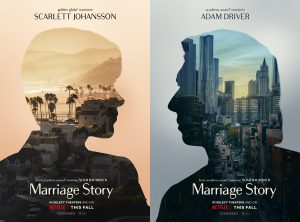 The Field: Kathy Bates, “Richard Jewell”; Laura Dern, “Marriage Story”; Scarlett Johansson, “Jojo Rabbit”; Florence Pugh, “Little Women”; Margot Robbie, “Bombshell”
The Field: Kathy Bates, “Richard Jewell”; Laura Dern, “Marriage Story”; Scarlett Johansson, “Jojo Rabbit”; Florence Pugh, “Little Women”; Margot Robbie, “Bombshell”
Who Will Likely Win: Laura Dern. Having taken home the Golden Globe, Critics Choice and Screen Actors Guild Awards in this category, Dern is well on her way to locking up this honor – and deservingly so.
Who Should Win (Based on the Nominees): Laura Dern. She’s great, and, with this being her third nomination without a prior win, it’s her time.
Who Should Win (Based on All Eligible Candidates): Laura Dern. Are we seeing a pattern here? But, with that said, there are three other excellent portrayals that would be just as deserving: Octavia Spencer for “Luce,” Shuzhen Zhao for “The Farewell” and Jamie Lee Curtis for “An Acceptable Loss,” fine performances that should have received far more attention than they did.
Possible Dark Horses: Kathy Bates. Having won the National Board of Review award in this category, Bates is the only actress to have bested Dern this year, and that could keep her in the running. However, given the juggernaut that Dern has been building, it may be difficult for anyone to stop her from taking home the statue.
Also-Rans: Anyone who isn’t Laura Dern, but that’s especially true for Florence Pugh and Margot Robbie, despite the strength of their performances.
Who Should Have Been Left Out: Scarlett Johansson. As wonderful as Johansson is in “Marriage Story,” her performance here comes up a little short by comparison. With a more deserving nomination under her belt for her other role, this slot should have been left open for someone else. It should be noted, though, that there’s always the possibility (admittedly remote) that she could take home the award in this category as “the consolation prize” for losing out on the lead actress award (much the same way Jessica Lange did in her 1983 supporting actress win for “Tootsie” after losing out on the evening’s top prize for “Frances”). I don’t expect that to happen, but it’s not out of the realm of possibility.
Who Else Should Have Been Considered: There were a number of other worthy performances deserving of consideration, including Annette Bening, “The Report”; Octavia Spencer, “Luce”; Naomi Watts, “Luce”; Andrea Bang, “Luce”; Shuzhen Zhao, “The Farewell”; Jamie Lee Curtis, “An Acceptable Loss”; Jamie Lee Curtis, “Knives Out”; Toni Collette, “Knives Out”; Tilda Swinton, “The Dead Don’t Die”; Maggie Smith, “Downton Abbey”; Taylor Russell, “Waves”; Olivia Wilde, “Richard Jewell”; Nicole Kidman, “Bombshell”; and Allison Janney, “Bombshell.”
Snubs: The most obvious snub here was the exclusion of Jennifer Lopez for “Hustlers,” though, like Adam Sandler in the best actor category, Academy voters got it right where this performance was concerned, a solid but overrated portrayal not worthy of a nomination. A lesser-known but more disappointing snub in this category was the exclusion of Shuzhen Zhao for her superb performance as the lovable grandmother in “The Farewell,” a nod that should have gone to her instead of Johansson’s secondary, throwaway nomination.
Best Director The Field: Martin Scorsese, “The Irishman”; Todd Phillips, “Joker”; Sam Mendes, “1917”; Quentin Tarantino, “Once Upon a Time…in Hollywood”; Bong Joon Ho, “Parasite”
The Field: Martin Scorsese, “The Irishman”; Todd Phillips, “Joker”; Sam Mendes, “1917”; Quentin Tarantino, “Once Upon a Time…in Hollywood”; Bong Joon Ho, “Parasite”
Who Will Likely Win: It’s open season, and potentially anyone could win. A valid case could be made for each nominee: Martin Scorsese is a Hollywood legend (and an adored favorite), and there are many fans of “The Irishman” among Academy voters. Todd Phillips’s film “Joker” received the most nominations of any picture, and it made a boatload of money, so a statue in this category could be seen as a reward for his efforts. Sam Mendes has directed a brilliant film, the kind that Hollywood loves to honor (often along with said picture’s creator), and he has already won Golden Globe and Critics Choice Awards for it. Quentin Tarantino, a longtime Tinsel Town darling, has never picked up a director’s award, despite two screenplay wins, an “oversight” that voters may want to correct this year. And Critics Choice Award winner Bong Joon Ho, the true artist of the field, has demonstrated the skill deserving of this honor, having won a Critics Choice Award in this category and capturing the top prize at the Cannes Film Festival with his edgy but incisive offering.
To complicate matters, the winner of this award is very much tied to the result in the best picture category. For many years, the awards for best picture and director were solidly aligned in tandem. However, in recent years, once-rare splits have become much more commonplace, and I strongly suspect that will be the case again this year. And, given that each of the five films in this category also have strong cases in their favor for best picture, determining exactly how a split would play out is difficult considering the many possible permutations involved.
So what is the most likely scenario? Essentially, anything is possible, though I’m fairly certain that one film won’t take home both awards. Given what’s happened in this year’s awards season thus far, I believe Scorsese and Phillips are the nominees most “easily” eliminated. Of the remaining nominees, Bong Joon Ho, for all his brilliance and despite his CCA victory, may well be the candidate on the outside looking in. That leaves Tarantino and Mendes, and I suspect this is the pair that will ultimately duel it out for the statue. Given my best picture award prediction (see below), if there’s to be a split for the winners in these two categories, I’d have to give the edge to Tarantino, especially since he has never received an Oscar in this category and Mendes has (for “American Beauty” in 2000). However, with all that said, I could still be wrong.
Who Should Win (Based on the Nominees): Bong Joon Ho. “Parasite” is my favorite film of 2019, and it would not have earned that distinction were it not for its director. He is the class of the field and truly deserves to win.
Who Should Win (Based on All Eligible Candidates): Bong Joon Ho. Need I say more?
Possible Dark Horses: As I see it, all of the nominees in this category are equally favorites and dark horses. However, based on what I wrote above, if Tarantino is the most likely contender to take home the prize, the dark horses who stand the best chance of an “upset” are Bong Joon Ho and Mendes (if such wins could even be accurately characterized as such).
Also-Rans: Whoever doesn’t win!
Who Should Have Been Left Out: Martin Scorsese, Todd Phillips and Quentin Tarantino. It might sound a bit outlandish to exclude three industry heavyweights, but I have my reasons. “The Irishman,” while a good film, is not quite up to Scorsese’s usual standards, and his inclusion here somewhat undermines the quality of his past – and far better – efforts. As for “Joker,” the picture represents an ambitious step up for Phillips as a filmmaker, but the movie is not without its problems, detractions that keep it from being truly great (and worthy of a nomination in this category). But the biggest issue for me here is with Tarantino, the most overrated director in the business today and the creator of a truly awful picture, one that’s boring, pointless, needlessly gratuitous and in just plain bad taste. I’m completely at a loss to understand the fascination with his work, and I’m truly disheartened that he may well be on the brink of winning an award for which he is so ill-suited.
Who Else Should Have Been Considered: There were a number of other worthy directorial efforts deserving of consideration this year, including Noah Baumbach, “Marriage Story”; Scott Z. Burns, “The Report”; Julius Onah, “Luce”; Lulu Wang, “The Farewell”; Dexter Fletcher, “Rocketman”; Kent Jones, “Diane”; Jordan Peele, “Us”; Cristina Gallego and Ciro Guerra, “Birds of Passage” (“Pájaros de verana”); and Todd Haynes, “Dark Waters.” Other possible contenders (who could end up being 2021 candidates) are Shannon Murphy, “Babyteeth,” and Andrés Wood, “Spider” (“Araña”).
Snubs: Many Oscar watchers were surprised by the exclusion of Greta Gerwig for “Little Women” in this category. Gerwig earned considerable, though somewhat hyped, praise for her work on “Lady Bird” (2017), and she was expected to capture another best director nomination here. But, in my opinion once again, Academy voters got this one right; “Little Women” is an underwhelming effort with a number of problems, and, with the possible exception of Pugh’s supporting actress nod, is far from deserving of the six nominations it has received. A more inexcusable snub would be the exclusion of Jordan Peele for “Us,” a remarkable film that didn’t pick up any nominations but that should have received ample accolades, including in this category. One could also argue that the exclusions of Lulu Wang for “The Farewell,” Noah Baumbach for “Marriage Story” and Dexter Fletcher for “Rocketman” represent snubs, though perhaps not to the same degree as the others.
Best Picture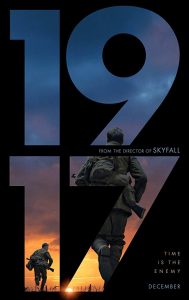 The Field: “Ford v Ferrari,” “The Irishman,” “Jojo Rabbit,” “Joker,” “Little Women,” “Marriage Story,” “1917,” “Once Upon a Time…in Hollywood,” “Parasite”
The Field: “Ford v Ferrari,” “The Irishman,” “Jojo Rabbit,” “Joker,” “Little Women,” “Marriage Story,” “1917,” “Once Upon a Time…in Hollywood,” “Parasite”
What Will Likely Win: It’s open season here among several contenders, but, based on how matters are likely to play out in the directors’ race and on the winners selected in this season’s early competitions, I would give the edge here to “1917.” This movie has all of the elements that make for a classic best picture winner. It’s the kind of grand, sweeping epic that Hollywood likes to think it makes all the time. Also, it’s a period piece rooted in historical fact, the kind of story the industry loves to honor. Finally, it’s the sort of “safe” choice that the Academy has been leaning toward in this category more in recent years. Add to all that the fact that the picture captured the Producers Guild Award for best feature film – often a solid predictor of the eventual Oscar winner – and you’ve got an amalgamation of elements that lend themselves well to a winning combination, one that I feel confident will unfold on award night.
What Should Win (Based on the Nominees): “Parasite.” Hands down, this is the best picture of 2019. Thankfully the Academy wisely thought it deserved to be included in the field of nominees, a rare feat for a foreign language film.
What Should Win (Based on All Eligible Candidates): “Parasite.” Again, need I say more?
Possible Dark Horses: “Parasite,” “Once Upon a Time…in Hollywood,” “The Irishman” and “Joker.” See the above discussion regarding the best director award. Again, it might seem strange to consider these films “dark horses,” but much depends on how the projected split noted above plays out. If the director award moves in a different direction, the winner in this category is likely to follow suit.
Also-Rans: “Ford v Ferrari,” “Jojo Rabbit,” “Little Women” and, sadly, “Marriage Story.” These films should consider their nominations their awards.
What Should Have Been Left Out: This is a terrible field. It’s more accurately characterized by what should have been left in, with the rest of them dumped. In my opinion, the only nominees worth keeping are “Marriage Story,” “1917” and “Parasite.” “Ford v Ferrari,” “Joker,” “Jojo Rabbit” and “The Irishman” are marginal, and “Little Women” and “Once Upon a Time…in Hollywood” never should have been considered, let alone included.
What Else Should Have Been Considered: It’s truly unfortunate that the Academy has taken such a narrow (some might say “dim”) view of the available offerings, especially in light of what ended up making the cut. There were many others worthy of consideration, including “Diane,” “The Report,” “Luce,” “The Farewell,” “Rocketman,” “Us,” “Birds of Passage” (“Pájaros de verana”), “Official Secrets” and “Dark Waters.” Other possible contenders (which could end up being 2021 candidates) are “Babyteeth” and “Spider” (“Araña”).
Snubs: The Academy’s decision to leave out “Us,” “Rocketman” and “The Farewell” was unfortunate. They all belong here instead of some of the lesser offerings that were included.
Sadly, 2019 was a rather mediocre year for movies, rather devoid of quality offerings for much of the first half and only redeeming itself somewhat in the concluding months. Here’s hoping 2020 brings viewers a better selection of choices.
In the meantime, the Oscars will be handed out in televised ceremonies on Sunday February 9. I’ll post my report card on these predictions thereafter. Enjoy the show!
(Oscar® and Academy Award® are registered trademarks of the Academy of Motion Picture Arts & Sciences.)
Reviews of some of the leading contenders are available at the following links:
“1917”
“A Beautiful Day in the Neighborhood”
“Bombshell”
“Harriet”
“Jojo Rabbit”
“Joker”
“Judy”
“Marriage Story”
“Parasite”
Reviews of other films that should have been in the running are available at the following links:
“An Acceptable Loss”
“Birds of Passage”
“Dark Waters“
“Diane”
“Honey Boy”
“Late Night”
“Luce”
“Official Secrets”
“Rocketman”
“The Art of Self-Defense”
“The Best of Enemies”
“The Farewell”
“The Peanut Butter Falcon”
“The Report”
“The Tomorrow Man”
“Us”
“Where’d You Go, Bernadette?”
Copyright © 2020, by Brent Marchant. All rights reserved.

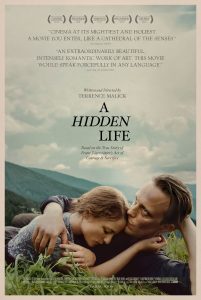


“1917” (2019). Cast: George MacKay, Dean-Charles Chapman, Colin Firth, Benedict Cumberbatch, Mark Strong, Andrew Scott, Richard Madden, Daniel Mays, Claire Duburcq, Roland Maaser. Director: Sam Mendes. Screenplay: Sam Mendes and Krysty Wilson-Cairns. Web site. Trailer.
How aware are we of our existence? We may think we have a good handle on it, but do we really? Sometimes we need a “reality check,” where we’re thrown into a scenario that gives us a greater and more mindful appreciation of the realm in which we find ourselves. That can be a rude awakening, for sure, as a pair of young soldiers discover for themselves in the new wartime drama, “1917.”
With the brutal combat of World War I stuck in a virtual stalemate between opposing British and German forces on the ravaged French landscape, it appeared as though the woefully deadlocked battle would rage on in perpetuity unless some kind of significant break in the impasse occurred. Yet, as unlikely as that possibility began to seem, in April 1917, it looked as though just such a development was starting to emerge. German troops began what appeared to be a retreat, leading British forces to believe that their enemy was at last on the run, opening up an opportunity for an assault that would give them the upper hand. There was just one problem with that assessment: British military intelligence learned that the alleged German retreat was a ruse to trap the advancing British soldiers, leaving front-line forces vulnerable, for all practical purposes, to a battlefield massacre. And, since the German troops cut the communications lines in their withdrawal, there was no way to warn Allied forces of what they were up against.
To prevent a disaster, British Gen. Erinmore (Colin Firth) commissioned two of his soldiers, Lance Cpl. William Schofield (George MacKay) and Lance Cpl. Thomas Blake (Dean-Charles Chapman), to traverse the battle-scarred countryside to deliver a warning to Col. Mackenzie (Benedict Cumberbatch), commander of the front-line troops. The young recruits were thus charged with embarking on a dangerous journey to be carried out on a tight time frame. And, with the lives of 1,600 British soldiers at stake, including the older brother of one of the messengers, Lt. Joseph Blake (Richard Madden), success was absolutely crucial.
Under harrowing conditions, the two young soldiers thus begin their arduous journey. Along the way, they encounter all manner of battlefield horrors, including countless unburied decaying corpses, packs of enormous ravenous rodents, booby-trapped bunkers and relentless enemy snipers. They also witness disasters, such as a tragic biplane crash and a village set ablaze whose burning buildings resemble the gates of hell. To be sure, there are allies to be had, too, such as a convoy of British troops led by wise and compassionate Capt. Smith (Mark Strong), who offers profoundly insightful advice about delivering the warning if the messengers indeed succeed in their task. But, even with such assistance, the journey is a race against time – and tragedy – to prevent an even greater calamity from happening.
[caption id="attachment_11237" align="aligncenter" width="350"] Lance Cpl. William Schofield (George MacKay, center) desperately seeks to deliver a warning to the commander of British troops being set up for a trap by German forces in the compelling new World War I drama, “1917.” Photo by François Duhamel, courtesy of Universal Pictures and DreamWorks Pictures.[/caption]
Lance Cpl. William Schofield (George MacKay, center) desperately seeks to deliver a warning to the commander of British troops being set up for a trap by German forces in the compelling new World War I drama, “1917.” Photo by François Duhamel, courtesy of Universal Pictures and DreamWorks Pictures.[/caption]
“1917” is an intriguing film in a number of ways, both in terms of its face value messages, as well as its deeper, metaphysical meaning, qualities conveyed both by the picture’s narrative and its approach in telling that story. Both are accomplished by a common root, the beliefs that made it all possible, both in the minds of the characters in the script and in the imagination of the filmmakers. And, in each case, these accomplishments are attained thanks to the conscious creation process, the philosophy that maintains we draw upon these powerful metaphysical tools in manifesting the reality experienced both in the lives of the characters on the screen and in the minds of audience members viewing their story as it plays out.
One of the key themes in this picture is its depiction of the hell of warfare, and drawing upon World War I to do that is an intriguing choice. Given that it was essentially the first modern conflict, it represented the first time that new types of weapons capable of inflicting horrific damage were used. In many ways, it wasn’t clear just how destructive they could be until they were actually deployed, and this war provided that opportunity. It showed us, for better or worse, just how deadly and devastating they could be, something that began to open eyes about where the practice of warfare could be headed. Instead of being celebrated as a grand adventure for young, impressionable, naïve youth, war was, likely for the first time, beginning to be seen as the atrocity it is. And this film, while graphic but not gratuitous, depicts that for viewers, particularly those who may have gone into the theater believing otherwise.
[caption id="attachment_11238" align="aligncenter" width="350"] Lance Cpl. William Schofield (George MacKay, right) and Lance Cpl. Thomas Blake (Dean-Charles Chapman, left) cross battle-ravaged France to deliver a message to their fellow British troops in director Sam Mendes’s latest offering, “1917.” Photo by François Duhamel, courtesy of Universal Pictures and DreamWorks Pictures.[/caption]
Lance Cpl. William Schofield (George MacKay, right) and Lance Cpl. Thomas Blake (Dean-Charles Chapman, left) cross battle-ravaged France to deliver a message to their fellow British troops in director Sam Mendes’s latest offering, “1917.” Photo by François Duhamel, courtesy of Universal Pictures and DreamWorks Pictures.[/caption]
This is by no means meant to denigrate the heroism of the courageous soldiers who went off to war to fight what they believed was a noble cause. The efforts of the brave young corporals to relay their message under harrowing circumstances is by all means something to be saluted, even if the film’s larger message is designed to get us to question the wisdom of how we end up getting ourselves into situations where we need to tackle tasks like this in the first place. From the characters’ perspective, we get to see their beliefs laid out before them in the reality they experience, offering them glimpses of the nobility they cling to, as well as the sheer terror that accompanies this scenario. And, from a filmmaker’s perspective, given this complex and contradictory mixture of influences involved here, seamlessly blending them into a single narrative requires striking a delicate balance that shows the validity of each set of beliefs and what they ended up manifesting.
Which is where the creator’s astutely insightful storytelling techniques for this tale come into play. Director Sam Mendes, with the collaboration of legendary cinematographer Roger Deakins, filmed “1917” as if it were one long, continuous shot. By filming the picture in this way, the audience is with the protagonists for the entire movie, always by their side, as if viewers were vicariously part of the narrative. In fact, the only way one can realistically get away from the story would be to get up and leave the theater.
[caption id="attachment_11239" align="aligncenter" width="350"] British Gen. Erinmore (Colin Firth, center) commissions two of his troops to deliver a warning to his front-line troops being set up for a trap by German forces in the compelling new World War I drama, “1917.” Photo by François Duhamel, courtesy of Universal Pictures and DreamWorks Pictures.[/caption]
British Gen. Erinmore (Colin Firth, center) commissions two of his troops to deliver a warning to his front-line troops being set up for a trap by German forces in the compelling new World War I drama, “1917.” Photo by François Duhamel, courtesy of Universal Pictures and DreamWorks Pictures.[/caption]
By shooting the film in this way, Mendes gives viewers a front-row seat to the action, an in-your-face way of letting the audience in on the perils that the protagonists face. It’s a technique that effectively enhances the themes of heroism and horror that the picture conveys to those watching it. In many regards, it makes the story seem more “real” than if it were told using more conventional filming techniques, making the experience more “personal” for the viewer, something that I believe is critical to depicting exactly what constitutes the wartime experience – and makes us think twice about why we would consciously create circumstances consisting of such conditions in the first place.
On an even more metaphysically fundamental level, “1917” not only drives home the reality of the wartime experience, but it also makes reality in general seem more “real” than movies or other visual media produced with more traditional practices. On a philosophically instructional level, that makes this a truly important film, one that clearly depicts “the reality of reality.” In an age where it’s easy for us to tune out and lose touch with what’s going on around us, “1917” helps to increase our awareness of the existence that surrounds us, intrinsically connecting us and making apparent what role we play within it. That’s quite an accomplishment for a film that superficially would seem to be just telling us a war story, a quality that really allows it to make its mark in the world of cinema.
[caption id="attachment_11240" align="aligncenter" width="350"]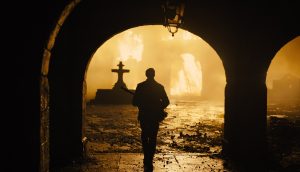 Lance Cpl. William Schofield (George MacKay) enters a French town set ablaze by allegedly retreating German troops, creating a scene resembling the gates of hell, in the compelling new World War I drama, “1917.” Photo courtesy of Universal Pictures and DreamWorks Pictures.[/caption]
Lance Cpl. William Schofield (George MacKay) enters a French town set ablaze by allegedly retreating German troops, creating a scene resembling the gates of hell, in the compelling new World War I drama, “1917.” Photo courtesy of Universal Pictures and DreamWorks Pictures.[/caption]
Despite a somewhat slow beginning, this otherwise-gripping tale somewhat reminiscent of “Gallipoli” (1981) takes viewers on a first-person journey through battle-ravaged Europe. By bringing the war to the front row of the theater, audiences get to experience the terror of the conflict through a story capable of genuinely frightening viewers better than any of the best horror flicks on the market. The fine lead performances of MacKay and Chapman, along with Deakins’s stunning photography, Thomas Newman’s riveting score and Mendes’s expert direction, combine to make this truly one of the year’s best offerings. The effect may leave viewers feeling a bit claustrophobic and shell-shocked at times, but then that’s a sure sign the filmmakers have done their job.
“1917” has been lavishly praised in this year’s awards competitions. The National Board of Review named it one of 2019’s Top 10 films and bestowed a special achievement award to Deakins for outstanding cinematography. At the Golden Globes, the film won awards for best dramatic picture and best director, along with a nomination for best score. In the Critics Choice Award contest, “1917” took home honors for best director (tied with Bong Joon Ho for “Parasite”), cinematography and editing, as well as five additional nominations, including best picture. In upcoming competitions, the film has earned nine nominations in the BAFTA Awards, including best picture and director, and 10 Oscar nods, including best picture, director and original screenplay. That’s quite a haul for a truly impressive picture.
[caption id="attachment_11241" align="aligncenter" width="350"] Getting a warning to British Col. Mackenzie (Benedict Cumberbatch, right) in time to prevent a battlefield massacre is the assignment given to Lance Cpl. William Schofield (George MacKay, left) in the highly decorated World War I drama, “1917.” Photo by François Duhamel, courtesy of Universal Pictures and DreamWorks Pictures.[/caption]
Getting a warning to British Col. Mackenzie (Benedict Cumberbatch, right) in time to prevent a battlefield massacre is the assignment given to Lance Cpl. William Schofield (George MacKay, left) in the highly decorated World War I drama, “1917.” Photo by François Duhamel, courtesy of Universal Pictures and DreamWorks Pictures.[/caption]
In an age where we find our senses being increasingly dulled by all sorts of distractions, it can be easy to lose track of what constitutes our reality. It’s a practice we engage in at our peril, for, if we lose sight of our existence, we may eventually lose sight of ourselves, wandering about lost in a reality where we have no connection to our surroundings, how they arose or how we got there. Films like “1917” help to shake us out of that complacency, waking us up to what’s going on and forcing us to become aware of how we respond to it. Ideally, it would probably be better to not have to be pushed into such circumstances, but, just in case we need a potent reminder, we have examples such as this to wake us up – and to keep us from drifting off into scenarios we’d much rather avoid.
Copyright © 2020, by Brent Marchant. All rights reserved.


“A Hidden Life” (2019). Cast: August Diehl, Valerie Pachner, Maria Simon, Karin Neuhäuser, Matthias Schoenaerts, Franz Rogowski, Bruno Ganz, Tobias Moretti, Ulrich Mathes, Karl Markovics, Michael Nyqvist, Johannes Krisch, Johan Leysen, Alexander Fehling, Ida Mutschlechner, Maria Weger, Aennie Lade. Director: Terrence Malick. Screenplay: Terrence Malick. Web site. Trailer.
Following our conscience often poses us with some of the most potent dilemmas we will encounter during our lifetimes. Such situations force us to confront doing what we believe to be the right thing in the face of circumstances that would seek to compel us to respond otherwise. The effect may be confounding, perhaps even paralyzing, but it generally pushes us to follow our hearts and minds, to address our innermost beliefs in being true to ourselves. So it was for a mild-mannered everyman saddled with dire conditions in the new fact-based historical drama, “A Hidden Life.”
In the idyllic mountain village of St. Radegrund, Austria, the horrors of World War II seem a world away. In fact, it’s the perfect setting for peasant farmer Franz Jãgerstãtter (August Diehl) to live out the life of peace and contentment that he so fervidly loves. With his wife Fani (Valerie Pachner) and their three daughters (Ida Mutschlechner, Maria Weger, Aennie Lade), Franz carves out a modest but comfortable living, eventually inviting his mother, Rosalie (Karin Neuhäuser), and Fani’s sister, Resie (Maria Simon), to come live with them. Together they all share good relations with their neighbors in this tightly knit community, and they derive ample solace from their involvement with the local Roman Catholic parish under the guidance of Father Fürthauer (Tobias Moretti). It’s an existence that gives them everything they need.
[caption id="attachment_11226" align="aligncenter" width="350"] Peasant farmer Franz Jãgerstãtter (August Diehl) enjoys an idyllic life in the mountain village of St. Radegrund, Austria in spite of the ravages of World War II hanging over him and his family in the new fact-based historical drama, “A Hidden Life.” Photo by Reiner Bajo, courtesy of Fox Searchlight Pictures.[/caption]
Peasant farmer Franz Jãgerstãtter (August Diehl) enjoys an idyllic life in the mountain village of St. Radegrund, Austria in spite of the ravages of World War II hanging over him and his family in the new fact-based historical drama, “A Hidden Life.” Photo by Reiner Bajo, courtesy of Fox Searchlight Pictures.[/caption]
Unfortunately, the outside world unavoidably intrudes upon their way of life. With Austria under the control of Adolf Hitler’s Third Reich, all eligible men are called upon to partake in basic military training. Franz initially resists the idea, but he eventually relents, fulfilling his civic obligation. However, upon word of France’s surrender, with many believing that the war will be over soon, Franz is sent back home, hoping his duty is behind him and giving him encouragement that he can return to a normal life permanently. But, as quickly becomes apparent, the war is far from over, and Franz is called up for military service.
Franz is more troubled about serving as a soldier than he was about going through basic training. The reason: He’s unwilling to take the oath of allegiance to Hitler and the Third Reich that all new recruits are required to make. When he considers what the Nazis have done to the German people and the residents of neighboring countries, he can’t bring himself to pledge his loyalty to a regime whose policies and practices he fundamentally disagrees with. He’s sincere about his opposition, and, to demonstrate his reluctance, he even goes so far as to consult the head of the local diocese, Bishop Fliesser (Michael Nyqvist), for advice. However, in doing so, Franz doesn’t get the answer he expects; rather than the Bishop telling him he should follow his conscience, he’s told that he has a duty to the Fatherland that he must honor lest his loyalty be called into question.
What’s more, when word of Franz’s hesitancy to pledge his allegiance spreads throughout St. Radegrund, he’s labeled a traitor. He and his family are demonstrably ostracized by most community residents, and the town’s mayor (Karl Markovics) openly chastises Franz for his disloyalty. As Franz wrestles with his decision, life at home becomes increasingly difficult for everyone.
[caption id="attachment_11227" align="aligncenter" width="350"] Farmer Franz Jãgerstãtter (August Diehl, center) and his wife, Fani (Valerie Pachner, right), derive tremendous faith from their Roman Catholic parish in the face of perils threatening to destroy their peaceful existence in World War II Austria in writer-director Terrence Malick’s “A Hidden Life.” Photo by Reiner Bajo, courtesy of Fox Searchlight Pictures.[/caption]
Farmer Franz Jãgerstãtter (August Diehl, center) and his wife, Fani (Valerie Pachner, right), derive tremendous faith from their Roman Catholic parish in the face of perils threatening to destroy their peaceful existence in World War II Austria in writer-director Terrence Malick’s “A Hidden Life.” Photo by Reiner Bajo, courtesy of Fox Searchlight Pictures.[/caption]
After considerable soul-searching, Franz finally decides to report for duty, much to Fani’s dismay. He believes he must fulfill his obligation. But, despite this sense of responsibility to his country, he has no intention of taking the oath, honoring his responsibility to himself. And, when he follows through on this intention, he’s thrown in jail, first in a holding facility in Enns and then later in a prison in Berlin.
While awaiting trial for his “crime,” Franz is subjected to all manner of brutality at the hands of prison guards, not to mention the harsh living conditions of this new existence. His only source of comfort throughout this ordeal is his ability to exchange letters with Fani. His love for his wife fills him with the strength he needs to carry on, a feeling that she likewise draws upon to keep up with the demands of running the farm. But, as time passes, Franz’s prospects look progressively bleak as he holds fast to his decision.
When the time for Franz’s trial comes, his lawyer (Alexander Fehling) urges him to take the oath, given that it will almost assuredly result in dismissal of the charges against him. In fact, given the looming consequences, Franz’s attorney tries to convince him to take this step even if he doesn’t mean what he says. But Franz remains resolute, knowing that a lie would be a betrayal to himself on par with the repulsion he would feel for actually taking the oath. And so he places conscience before coercion, a decision that leaves him in a precarious position and facing an uncertain future, one whose impact is certain to affect both Franz and everyone he loves.
[caption id="attachment_11228" align="aligncenter" width="350"]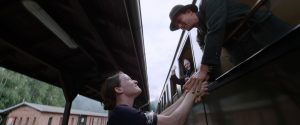 Austrian farmer Franz Jãgerstãtter (August Diehl, right) puts up a brave front as he bids farewell to his wife, Fani (Valerie Pachner, left), as he leaves his mountain village to fulfill military obligations during World War II in “A Hidden Life.” Photo courtesy of Fox Searchlight Pictures, © 2019 Twentieth Century Fox Film Corporation.[/caption]
Austrian farmer Franz Jãgerstãtter (August Diehl, right) puts up a brave front as he bids farewell to his wife, Fani (Valerie Pachner, left), as he leaves his mountain village to fulfill military obligations during World War II in “A Hidden Life.” Photo courtesy of Fox Searchlight Pictures, © 2019 Twentieth Century Fox Film Corporation.[/caption]
Difficult situations such as this test the resolve of even the strongest among us. These kinds of circumstances pit us against ourselves, most notably our innermost beliefs, scenarios that can carry significant consequences. The importance in this rests with the fact that our responses to such challenges ultimately affect what we experience. And that’s because our beliefs shape the reality in which we find ourselves, the cornerstone principle of the conscious creation process, the philosophy that maintains we draw upon these metaphysical building blocks in manifesting our existence.
Franz has indeed set himself up for quite a test through his experience. As an openly conscientious objector – something virtually unheard of in his day and age – he places his personal beliefs before those of what’s expected of him. And, even though he ends up reporting for duty, he can’t bring himself to take the next step, one that he believes in his heart is wrong, despite the consequences involved.
Franz’s actions are significant for a variety of reasons. Not only are they an act of defiance to circumstances with which he fundamentally disagrees, but they are also a shining example of the principle of integrity, one of the key elements that affects the functioning of the conscious creation process. When we incorporate this principle into the beliefs that go into our manifestation efforts, we infuse the process with a heightened sense of personal earnestness, a quality that reflects the sincerity of our being, something that enables us to be supremely truthful with ourselves. And that, in turn, allows us to materialize a reality most in line with what we genuinely believe, one that most faithfully aligns with our innate heartfelt convictions.
Given what Franz adheres to, he truly faces quite an arduous path going forward. However, the beliefs behind these developments mirror who he really is. As becomes apparent in the film, he’s a devout man of faith who staunchly abides by his principles. If he’s to live with himself, he knows he must follow his heart, no matter how difficult his personal odyssey might be. He simply can’t capitulate to the mentality of being someone who’s “just following orders.” By maintaining his sense of integrity, he significantly increases the likelihood that his reality will fall into line with his beliefs, no matter what that may entail.
[caption id="attachment_11229" align="aligncenter" width="350"] Conscientious objector Franz Jãgerstãtter (August Diehl, right) faces the brutality of prison life when he refuses to swear an oath of allegiance to Adolf Hitler and the Third Reich as part of his military service during World War II in the new fact-based historic drama, “A Hidden Life.” Photo by Reiner Bajo, courtesy of Fox Searchlight Pictures.[/caption]
Conscientious objector Franz Jãgerstãtter (August Diehl, right) faces the brutality of prison life when he refuses to swear an oath of allegiance to Adolf Hitler and the Third Reich as part of his military service during World War II in the new fact-based historic drama, “A Hidden Life.” Photo by Reiner Bajo, courtesy of Fox Searchlight Pictures.[/caption]
Some might question the wisdom of Franz’s beliefs and actions in light of the consequences he faces. However, perhaps one of his missions in life is to set an example for others, to become a prototype for the conscientious objector model, something that no one may have done before (or at least not as openly as he does). It could be that a sentiment like the one expressed by Franz may play a vital role in helping to reshape a culture predicated on war and violence, especially if enough other individuals follow his lead. But, if the example he sets is to catch on, it has to start somewhere with someone, and maybe that’s where Franz comes in as a volunteer willing to establish the standard and make it known to the world, perilous though that course may be.
Charting such unknown territory requires a great deal of courage, and that’s another element that factors into Franz’s beliefs. By being willing to confront his fears, he gives himself the personal strength and fortitude he needs to follow this path. As conscious creators are well aware, the philosophy draws heavily upon the notion of “nothing ventured, nothing gained,” and that’s especially true in heroic endeavors like this. By fortifying himself in this way, Franz further increases the chances of being able to fulfill his aspirations and achieve something that the world has never seen before. That’s especially crucial for ventures that stand to benefit us all, both individually and collectively.
In taking the steps that he does, Franz freely embraces his sense of personal responsibility, an inherent aspect of conscious creation. That’s vital, because it’s something we can’t escape when we engage in this practice, no matter how readily or reluctantly we may embrace (or even recognize) this intrinsic connection. Franz knows what he’s doing, in spite of the consequences, yet he does so anyways, accepting conditions for what they are. He realizes that he must do this if he’s to live his truth and attain his goal, no matter how problematic that may be for him and those he cares about.
Accepting responsibility is also essential for those of us seeking to live out our value fulfillment, the conscious creation concept associated with being our best, truest selves for the betterment of ourselves and those around us. For those of us looking to invoke this in an initiative aimed at helping to change the character of society, this is critical if we hope to succeed. Franz rises to the occasion on this front, and, even though his story may not have been well known until now, his legacy has been established, one that’s worthy of being emulated in helping us to create a better world for everyone.
[caption id="attachment_11230" align="aligncenter" width="350"] When faced with a perilous fate for her imprisoned husband, Fani Jãgerstãtter (Valerie Pachner, center) travels to Berlin from her Austrian mountain village to provide much-needed comfort and strength in Terrence Malick’s “A Hidden Life.” Photo courtesy of Fox Searchlight Pictures, © 2019 Twentieth Century Fox Film Corporation.[/caption]
When faced with a perilous fate for her imprisoned husband, Fani Jãgerstãtter (Valerie Pachner, center) travels to Berlin from her Austrian mountain village to provide much-needed comfort and strength in Terrence Malick’s “A Hidden Life.” Photo courtesy of Fox Searchlight Pictures, © 2019 Twentieth Century Fox Film Corporation.[/caption]
While writer-director Terrence Malick’s stream of consciousness style of filmmaking may not be for everyone, he certainly presents his best example of this kind of work in his latest offering. As with nearly all of his pictures (which are known for including beautiful imagery for its own sake and not necessarily as a means for moving the story forward), this release could still use some judicious editing, considering its nearly three-hour runtime. However, given that this fact-based film features a more narrative-driven focus than some of his other works, that change, coupled with his signature style, make for a moving combination, one that’s simultaneously touching and beautiful to look at. Diehl and Pachner give quietly impassioned performances as protagonists wrestling with crises of conscience in World War II Austria, set against the beauty of their native countryside and the ugliness of Adolf Hitler's Nazi regime. Admittedly, this picture may try the patience of even the most diehard moviegoer, but it's worth sitting through even the slow passages given the rewards on offer.
“A Hidden Life” entered awards season with high hopes of significant recognition after winning the François Chalais Award and receiving a distinguished Palme d’Or nomination at the 2019 Cannes Film Festival. However, once the contenders in year-end competitions were announced, the picture didn’t live up to expectations. While the release was named one of the National Board of Review’s Top 10 Independent Films, its only other recognition came in the form of an Independent Spirit Award nomination for best feature. Considering that the crop of eligible 2019 releases left something to be desired, it’s unfortunate that this offering was summarily excluded from so many award programs.
It would be quite a world to live in if we were to have more individuals like Franz in our midst. Indeed, if we had just one courageous soul like him for every 10 others who believed and acted contrarily, our society and the greater reality of which it’s a part would likely be a very different place. That’s why it’s so important that the inspiring stories of heroes like this humble Austrian farmer are shared with the world, to provide us with examples of how to live differently than how we’re told, to bring about an existence in which we’re truthful with ourselves and courageously fulfill our intents to live lives in line with our hearts. It’s a possibility, to be sure, but it’s up to us to envision such an existence – and then to take the steps necessary to make it happen.
Copyright © 2019-20, by Brent Marchant. All rights reserved.